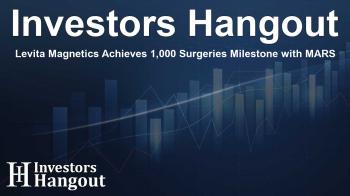Levita Magnetics Achieves 1,000 Surgeries Milestone with MARS

Levita Magnetics Celebrates a Remarkable Milestone
Levita Magnetics, a pioneer in advanced surgical technology, is making headlines with the remarkable achievement of surpassing 1,000 surgeries using its innovative Magnetic-Assisted Robotic Surgery (MARS) System. This milestone reflects the growing confidence that surgeons and patients alike place in this groundbreaking technology. As more healthcare professionals adopt the MARS system, patients are now benefiting from a less invasive surgical experience.
Significance of the 1,000th Surgery
Dr. Brian Ruhle, a clinical assistant professor at Stanford University School of Medicine, performed the landmark 1,000th procedure. Utilizing the MARS system, he conducted a gastric bypass, showcasing how the system enhances surgical precision while minimizing invasiveness. “This milestone is extraordinarily meaningful as it represents the numerous patients who have benefited from this innovative surgical approach,” Dr. Ruhle remarked.
Changing Dynamics in Surgery
The MARS System, featuring Levita's proprietary Dynamic Magnetic Positioning™ technology, is revolutionizing laparoscopic procedures. By using magnets to retract organs and tissues, the MARS system allows surgeons to perform complex surgeries with fewer incisions, resulting in quicker recovery times and improved patient comfort. This advancement signifies a major step forward in the realm of minimally invasive surgery.
Path of Innovation
The journey to this significant achievement is marked by numerous pioneering cases across leading hospitals in the United States and Latin America. Levita Magnetics has consistently focused on making surgical procedures less invasive and more effective. In the past couple of years, the rapid adoption of the MARS System by surgeons across various specialties highlights this commitment.
Key Milestones and Expansions
Among the notable achievements leading up to the 1,000th surgery are several key milestones:
- First Commercial Use: Surgeons at Cleveland Clinic performed the world’s first commercial MARS procedures, paving the way for its widespread adoption.
- International Deployment: The MARS system was introduced at Hospital Luis Tisne in Santiago, marking its first deployment outside the U.S.
- Augmented Reality Surgery: The first-ever augmented reality abdominal surgery was performed using the MARS system, illustrating the integration of new technology in surgical practices.
- Private Hospital Expansion: MARS expanded its reach to private hospitals, showcasing its versatility through successful complex surgeries.
- Robotic Surgical Collaboration: The MARS system was successfully used alongside other robotic systems to enhance surgical outcomes, demonstrating its adaptability.
- Broadened FDA Clearance: The recent expansion of FDA clearance for the MARS system signifies its increasing importance in treating complex abdominal conditions.
Looking Ahead: The Future of Surgery
Dr. Alberto Rodriguez-Navarro, the founder and CEO of Levita Magnetics, expressed optimism about the future, stating, “We are just beginning to scratch the surface of what’s possible with MARS technology.” As Levita continues to expand its global footprint, the rise in demand for less invasive surgical options underscores the potential for future growth and innovation.
Impact on Patient Outcomes
Levita Magnetics strengthens its position in the healthcare sector by consistently improving patient outcomes through surgical innovation. With every successful surgery, they redefine the possibilities within minimally invasive techniques, benefiting surgeons and patients alike. This technology is positioned as a game-changer, transforming how various surgical specialties are approached.
Frequently Asked Questions
What is the MARS System?
The MARS System is an innovative surgical platform by Levita Magnetics that uses magnetic technology to enhance laparoscopic surgeries, allowing for greater visualization and less invasiveness.
Who performed the 1,000th surgery with the MARS System?
Dr. Brian Ruhle, a clinical assistant professor at Stanford University School of Medicine, performed the 1,000th surgery, demonstrating the system's effectiveness in gastric bypass procedures.
What advantages does the MARS System offer patients?
The MARS System provides less invasive procedures, resulting in faster recovery times, reduced pain, and improved cosmetic outcomes compared to traditional surgical methods.
How has Levita Magnetics expanded its technology?
Levita Magnetics has achieved significant milestones, including international deployments, collaborations with cutting-edge technologies, and expanded FDA approvals, reinforcing the growth of the MARS System.
What is Levita Magnetics' mission?
Levita Magnetics aims to improve patient outcomes through surgical innovation by continually evolving their products to make surgeries more effective and less invasive for patients worldwide.
About The Author
Contact Logan Wright privately here. Or send an email with ATTN: Logan Wright as the subject to contact@investorshangout.com.
About Investors Hangout
Investors Hangout is a leading online stock forum for financial discussion and learning, offering a wide range of free tools and resources. It draws in traders of all levels, who exchange market knowledge, investigate trading tactics, and keep an eye on industry developments in real time. Featuring financial articles, stock message boards, quotes, charts, company profiles, and live news updates. Through cooperative learning and a wealth of informational resources, it helps users from novices creating their first portfolios to experts honing their techniques. Join Investors Hangout today: https://investorshangout.com/
The content of this article is based on factual, publicly available information and does not represent legal, financial, or investment advice. Investors Hangout does not offer financial advice, and the author is not a licensed financial advisor. Consult a qualified advisor before making any financial or investment decisions based on this article. This article should not be considered advice to purchase, sell, or hold any securities or other investments. If any of the material provided here is inaccurate, please contact us for corrections.

